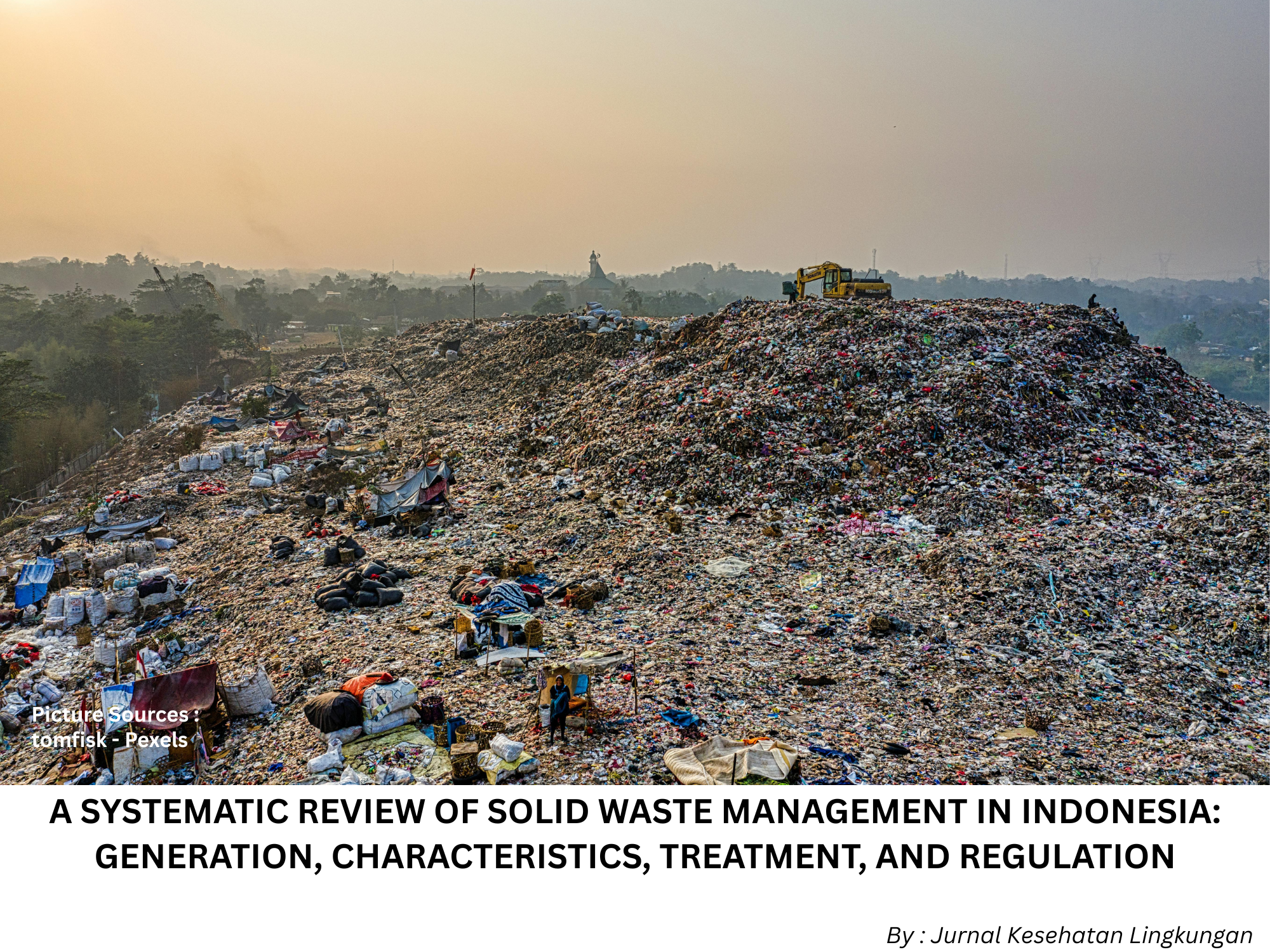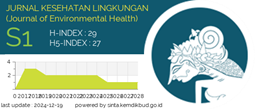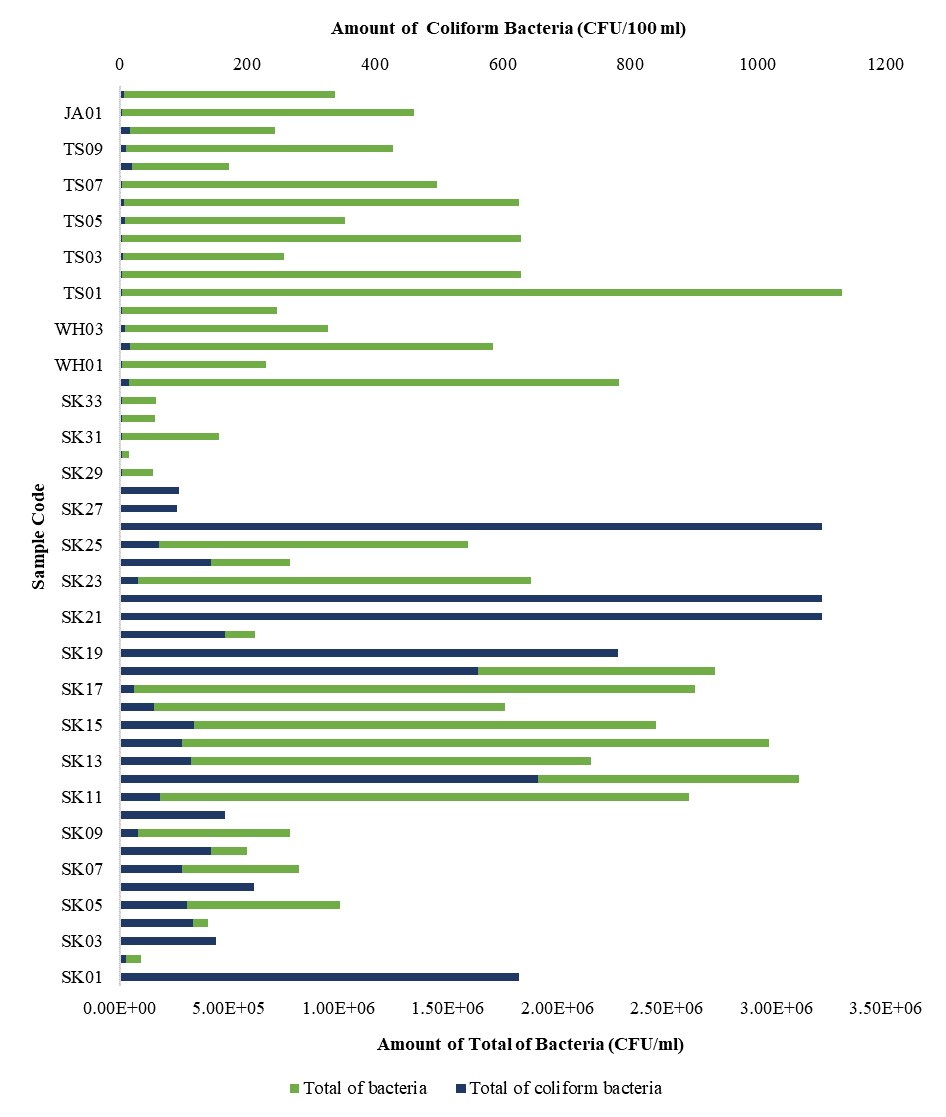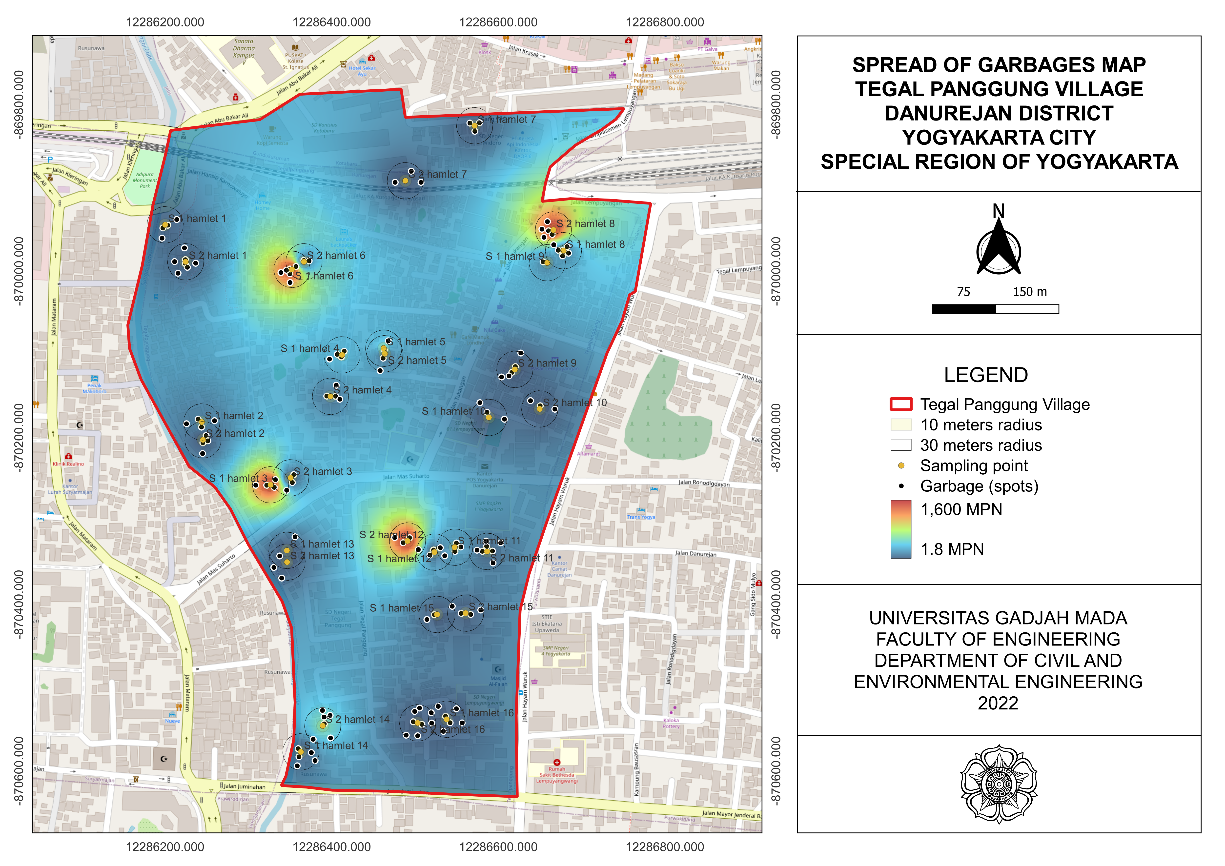A Systematic Review of Solid Waste Management in Indonesia: Generation, Characteristics, Treatment, and Regulation

Downloads
Introduction: Research on solid waste in Indonesia remains relatively fragmented, with many studies still focusing on the development of solid waste management in urban areas. This study seeks to address the information gap by reviewing the development of solid waste management in Indonesia. Discussion: This systematic review was conducted through literature searches in Scopus, PubMed, and Google Scholar, selecting 38 articles that specifically examined solid waste in Indonesia in terms of its generation, characteristics, management, and regulatory frameworks. Collective evidence showed that household waste generation in Indonesia is strongly influenced by various factors such as income level, residential location, season, and public awareness of waste management. Waste banks and the 3R approach are the main pillars of community-based strategies, with composting applied to organic waste. Waste processing facilities play a supporting role within the community, such as WTE and incineration. Landfills remain necessary as a final solution for residual waste that cannot be further processed. Law No. 18 of 2008 on Waste Management serves as the primary regulatory framework in Indonesia. This law shifts the traditional paradigm of "collect-transport-dispose" toward a more sustainable approach through the 3R principles. Conclusion: Solid waste generation in Indonesia is determined by socio-economic factors, urbanization, and consumption patterns. Management strategies emphasize community-based approaches such as waste banks, composting, and the 3R principle, supported by small-scale processing facilities, while landfills remain necessary for residual waste. The Law on Waste Management requires revision to align with current developments and emerging challenges in solid waste management.
Maalouf A, Agamuthu P. Waste Management Evolution in the Last Five Decades in Developing Countries – A Review. Waste Manag Res. 2023;41(9):1420–1434. https://doi.org/10.1177/0734242x231160099
World Bank. Internation Bank for Reconstruction and Development Project Appraisal Document on A Proposed Loan in the Amount of $100 Million to the Republic of Indonesia for a Improvement of Solid Waste Management to Support Regional and Metropolitan Cities. 2019. https://documents1.worldbank.org/curated/en/675331468752956553/pdf/multi0page.pdf
Wikurendra EA, Csonka A, Nagy I, Nurika G. Urbanization and Benefit of Integration Circular Economy into Waste Management in Indonesia: A Review. Circ Econ Sustain. 2024;4(2):1219–1248. https://doi.org/10.1007/s43615-024-00346-w
World Bank. Membersihkan Limbah Padat Perkotaan Indonesia. 2019. https://www.worldbank.org/in/news/press-release/2019/12/05/cleaning-up-indonesias-urban-solid-waste
Vinti G, Vaccari M. Solid Waste Management in Rural Communities of Developing Countries: an Overview of Challenges and Opportunities. Clean Technol. 2022;4(4):1138–1151. https://doi.org/10.3390/cleantechnol4040069
Ramadan BS, Rachman I, Ikhlas N, Kurniawan SB, Miftahadi MF, Matsumoto T. A Comprehensive Review of Domestic-Open Waste Burning: Recent Trends, Methodology Comparison, and Factors Assessment. J Mater Cycles Waste Manag. 2022;24(5):1633–1647. https://doi.org/10.1007/s10163-022-01430-9
Sugiharto SB, Ali K, Rizaldi MA. Exploring the Impact of River Pollution on Environmental Health in Central Java - Indonesia: A Narrative Literature Review and Sustainable Management Strategies. Promotor. 2025;8(3):450–457. https://doi.org/10.32832/pro.v8i3.1237
Ahsanti A, Husen A. Pengelolaan Sampah Berbasis Masyarakat dalam Mitigasi Perubahan Iklim: Suatu Telaah Sistematik. JGG-Jurnal Green Growth dan Manaj Lingkung. 2022;11(1):19-26 https://doi.org/10.21009/jgg.v11i1.19276
Kissi SK, Bryant IM, Boateng SN, Antwi GB. Assessment of Ghana’s Municipal Solid Waste for Valorization–a Review. preprints.org. 2024;1(1):1-16. https://doi.org/10.20944/preprints202409.1493.v1
Liu J, Zheng L. Structure Characteristics and Development Sustainability of Municipal Solid Waste Treatment in China. Ecol Indic. 2023;152(110391). 1-7. https://doi.org/10.1016/j.ecolind.2023.110391
Liu K, Huang T, Xia Z, Xia X, Wu R. The Impact Assessment of Low-Carbon City Pilot Policy on Urban Green Innovation: A Batch-Time Heterogeneity Perspective. Appl Energy. 2025;377(124489):1-15. https://doi.org/10.1016/j.apenergy.2024.124489
Xue Y, Liu X. Detoxification, Solidification and Recycling of Municipal Solid Waste Incineration Fly Ash: A review. Chem Eng J. 2021;420(130349):1-11. https://doi.org/10.1016/j.cej.2021.130349
Fasya AHZ, Ibad M, El MKUN. Analysis of Determinant Factors of Carbon Efficiency in Indonesia Based on Domestic Waste Management Using Causal Machine Learning. J Kesehat Lingkung. 2025;17(1):31–44. https://doi.org/10.20473/jkl.v17i1.2025.31-44
Page MJ, Moher D, Bossuyt PM, Boutron I, Hoffmann TC, Mulrow CD, et al. PRISMA 2020 Explanation and Elaboration: Updated Guidance and Exemplars for Reporting Systematic Reviews. BMJ. 2021;372:1–35. https://doi.org/10.1136/bmj.n160
Muis R, Rachman I, Matsumoto T. A Life Cycle Assessment of Biological Treatment Scenario of Municipal Solid Waste in Developing Country (Case Study : Makassar, Indonesia). IOP Conf Ser Earth Enviromental Sci. 2023;1263(1):1–8. https://doi.org/10.1088/1755-1315/1263/1/012070
Putra HP, Damanhuri E, Sembiring E. The Role of MRF in Indonesia’s Solid Waste Management System (case study of the Special Region of Yogyakarta, Indonesia). J Mater Cycles Waste Manag. 2020;22(2):396–404. https://doi.org/10.1007/s10163-020-00979-7
Raharjo S, Bachtiar VS, Ruslinda Y, Marsumoto T, Rachman I. Improvement of Recycling-Based Municipal Solid Waste Management in Padang City, West Sumatera, Indonesia. IOP Conf Ser Earth Enviromental Sci. 2019;245(1):1–7. https://doi.org/10.1088/1755-1315/245/1/012007
Harfadli MM, Ramadan BS, Ulimaz M, Rachman I, Matsumoto T. Environmental Impact and Priority Assessment of Municipal Solid Waste Management Scenarios In Balikpapan City , Indonesia. Clean Waste Syst. 2025;10(100223):1-13. https://doi.org/10.1016/j.clwas.2025.100223
Sari MM, Septiariva IY, Istanabi T, Suhardono S, Masni I, Sianipar J, et al. Comparison of Solid Waste Generation During and Before Pandemic Covid-19 in Indonesia Border Island (Riau Islands Province, Indonesia). Ecol Eng Environ Technol. 2023;24(2):251–260. https://doi.org/10.12912/27197050/157170
Dhokhikah Y, Trihadiningrum Y, Sunaryo S. Resources , Conservation and Recycling Community Participation in Household Solid Waste Reduction in Surabaya , Indonesia. Resour Conserv Recycl. 2015;102:153–162. http://dx.doi.org/10.1016/j.resconrec.2015.06.013
Trihadiningrum Y, Laksono IJ, Dhokhikah Y. Community Activities in Residential Solid Waste Reduction in Tenggilis Mejoyo District, Surabaya City, Indonesia. J Mater Cycles Waste Manag. 2017;19(1):526–535. https://doi.org/10.1007/s10163-015-0440-5
Anwar A, Amaranti R, Satori M, Salleh NA. Knowledge of Solid Waste Management Through Composting : A Comparative Study of Rural Communities in Malaysia and Indonesia. IOP Conf Ser Mater Sci Eng. 2020;830(1):6–10. https://doi.org/10.1088/1757-899X/830/4/042002
Khair H, Rachman I, Matsumoto T. Analyzing Household Waste Generation and its Composition to Expand the Solid Waste Bank Program in Indonesia : A Case Study of Medan City. J Mater Cycles Waste Manag. 2019;21(4):1027–1037. http://dx.doi.org/10.1007/s10163-019-00840-6
Azizah KN, Pawitra AS, Diyanah KC, Istighfarrani G. Pemanfaatan Timbulan Sampah dalam Upaya Pengurangan pada Fasilitas Bank Sampah di Jawa Timur Tahun 2022. Innov J Soc Sci Res. 2024;4(3):9353–9365. https://doi.org/10.31004/innovative.v4i3.11549
Khair H, Putri CN, Dalimunthe RA, Matsumoto T. Examining of Solid Waste Generation and Community Awareness Between City Center and Suburban Area in Medan City , Indonesia. IOP Conf Ser Mater Sci Eng. 2018;309(1):1–4. https://doi.org/10.1088/1757-899X/309/1/012050
Budhijanto W, Nyoman N, Marleni N, Marbelia L. Techno-Economic Analysis on Community-Based Municipal Solid Waste Processing Facilities : A Case Study in Sleman Regency Indonesia. Environ Dev. 2024;52(101083):1-14. https://doi.org/10.1016/j.envdev.2024.101083
Sunarto S, Purwanto P, Hadi SP. Quantification of Greenhouse Gas Emissions from Municipal Solid Waste Recycling and Disposal in Malang City Indonesia. J Ecol Eng. 2017;18(3):74–82. http://dx.doi.org/10.12911/22998993/70237
Rosesar SJ, Kristanto GA. Household Solid Waste Composition and Characterization in Indonesia Urban Kampong. IOP Conf Ser Mater Sci Eng. 2020;909(1):1–8. https://doi.org/10.1088/1757-899X/909/1/012077
Nurikah, Jajuli HER, Furqon E. Waste Management Governance Based on Law Number 18 of 2008 of Waste Management of Waste Based Citizen Participation in the Serang City. Gorontalo Law Rev. 2022;5(2):434–442. https://doi.org/10.32662/golrev.v5i2
Ruslinda Y, Aziz R, Putri FF. Analysis of Household Solid Waste Generation and Composition during the Covid-19 Pandemic In Padang City, Indonesia. Indones J Environ Manag Sustain. 2020;4(4):116–124. https://doi.org/10.26554/ijems.2020.4.4.116-124
Anggrasari H, Putri TWS, Perdana P, Cahyasita D. Pengaruh Tingkat Pendapatan dan Niat Menghindari Pemborosan Makanan (Food Waste) Terhadap Kerugian Ekonomi Pada Rumah Tangga di Kabupaten Sleman. Agrifo. 2025;10(1):32-41 https://doi.org/10.29103/ag.v10i1.21253
Mariantunnikmah K, Lubis MFA, Wintoko J, Budiman A. Characterization of Municipal Solid Waste Based on Seasonal Diversity as Energy Potential Materials. IOP Conf Ser Earth Enviromental Sci. 2024;2828(1):1–10. https://doi.org/10.1088/1742-6596/2828/1/012031
Islami RR, Moelyaningrum AD, Khorion. Analisis Sistem Pengelolaan Sampah di Tempat Pemrosesan Akhir (TPA) di Kabupaten Lumajang. J Kesehat Lingkung Indones. 2023;22(2):179–188. https://doi.org/10.14710/jkli.22.2.179-188
Sunaryani A. Prediction and Management of Household Solid Waste Generation During COVID-19 Pandemic in Bandung City Using System Dynamics Model. IOP Conf Ser Earth Enviromental Sci. 2022;1017(1):1–10. https://doi.org/10.1088/1755-1315/1017/1/012001
Anggraini N, Muis R, Ariani F, Yunus S, Syafri. Model of Solid Waste Management (SWM) in Coastal Slum Settlement : Evidence for Makassar City. Nat Environ Pollut Technol An Int Q Sci J. 2021;20(2):459–466. https://doi.org/10.46488/NEPT.2021.v20i02.002
Prihandoko D, Budiman A, Setyono P, Fandeli C, Budiastuti MTS. Appropriate Technology for Municipal Solid Waste Management Based on Wastepreneurship Implementation. ASEAN J Chem Eng. 2021;21(1):113–123. https://doi.org/10.22146/ajche.64496
Kusumaningtiar DA, Vionalita G, Swamilaksita PD. Household Solid Waste Management and Composition in Bekasi , Indonesia. Sci Found SPIROSKI, Skopje, Repub Maced. 2022;10(5):1472–1475. https://doi.org/10.3889/oamjms.2022.9884
Qonitan FD, Suryawan IWK, Rahman A. Overview of Municipal Solid Waste Generation and Energy Utilization Potential in Major Cities of Indonesia Overview of Municipal Solid Waste Generation and Energy Utilization Potential in Major Cities of Indonesia. J Phys Conf Ser. 2021;1858(1):1–9. https://doi.org/10.1088/1742-6596/1858/1/012064
Widyarsana IMW, Rahayu MAI. Solid Waste Management Planning for Sub‑District Scale : A Case Study in Buleleng Sub‑District , Buleleng District , Bali Province , Indonesia. J Mater Cycles Waste Manag. 2021;23(5):2051–2064. https://doi.org/10.1007/s10163-021-01261-0
Febijanto I, Steven S, Nadirah, Bahua H, Shoiful A, Dewanti DP, et al. Municipal Solid Waste (MSW) Reduction through Incineration for Electricity Purposes and its Environmental Performance : A Case Study in Bantargebang , West Java , Indonesia. Evergr Jt J Nov Carbon Resour Sci Green Asia Strateg. 2024;11(1):32–45. https://doi.org/10.5109/7172186
Yudiatmaja WE, Edison, Samnuzulsari T, Yudithia, Rezeki SRI, Suyito, et al. Reducing Solid Waste through Waste Banks : An Empirical Study in Kepulauan Riau, Indonesia. IOP Conf Ser Mater Sci Eng. 2021;755(1):1–6. https://doi.org/10.1088/1755-1315/755/1/012076
Safitri Y, Ariyaningsih, Shaw R. Stakeholders’ Involvement in Household Solid Waste Management (HSWM) during COVID-19 Case of Pontianak City, Indonesia. Int Rev Spat Plan Sustain Dev. 2024;12(3):238–259. https://doi.org/10.14246/irspsd.12.3_238
Khoiron, Probandari AN, Setyaningsih W, Kasjono HS. Implementation of Environmental Policy on Solid Waste Management in Bondowoso Regency - Indonesia. IOP Conf Ser Mater Sci Eng. 2020;1465(1):1–8. https://doi.org/10.1088/1757-899X/309/1/012050
Asteria D, Haryanto JT. Empowerment Key Factors in Shaping Women’s Awareness of Household Waste Management. Glob J Environ Sci Manag. 2021;7(3)1-11. https://doi.org/10.22034/gjesm.2021.03.01
Kubota R, Horita M, Tasaki T. Integration of Community ‑ Based Waste Bank Programs with the Municipal Solid ‑ Waste ‑ Management Policy in Makassar , Indonesia. J Mater Cycles Waste Manag. 2020;22(3):928–937. https://doi.org/10.1007/s10163-020-00969-9
Ghazali A, Tjakraatmadja JH, Sunarti, Pratiwi EYD. Resident Participation in Municipal Solid Waste Management Program. Glob J Environ Sci Manag. 2022;7(4):599–624. https://doi.org/10.22034/GJESM.2021.04.08
Raharjo S, Matsumoto T, Ihsan T, Rachman I. Community-based Solid Waste Bank Program for Municipal Solid Waste Management Improvement in Indonesia: A Case Study of Padang City. J Mater Cycles Waste Manag. 2017;19(1):201–212. https://doi.org/10.1007/s10163-015-0401-z
Jalloh MY, Dahalan WSAW, Khalid RM, Wulandari. Strengthening Household Solid Waste Management in Sierra Leone: Lessons from South Korea and Indoenesia. J Indones Leg Stud. 2024;9(2):943–984. https://doi.org/10/15294/jils.v9i2.19156
Mustafa AB, Dong H, Zhang C, Fujii M. Life Cycle Environmental Benefit and Waste‑To‑Energy Potential of Municipal Solid Waste Management Scenarios in Indonesia. J Mater Cycles Waste Manag. 2022;24(5):1859–1877. https://doi.org/10.1007/s10163-022-01441-6
Sulistiawati LY. Challenges in Marine Plastic Pollution Regulation in Indonesia. Asia Pacific J Environ Law. 2022;25(1):100–118. https://doi.org/10.4337/apjel.2022.01.05

This work is licensed under a Creative Commons Attribution-NonCommercial-ShareAlike 4.0 International License.
1. Copyright of all journal manuscripts is held by the Jurnal Kesehatan Lingkungan.2. Formal legal provisions to access digital articles of electronic journal are subject to the provision of the Creative Commons Attribution-ShareAlike license (CC BY-NC-SA), which means that Jurnal Kesehatan Lingkungan is rightful to keep, transfer media/format, manage in the form of databases, maintain, and publish articles.
3. Published manuscripts both printed and electronic are open access for educational, research, and library purposes. Additionally, the editorial board is not responsible for any violations of copyright law.
JKESLING by UNAIR is licensed under a Creative Commons Attribution-ShareAlike 4.0 International License.







































